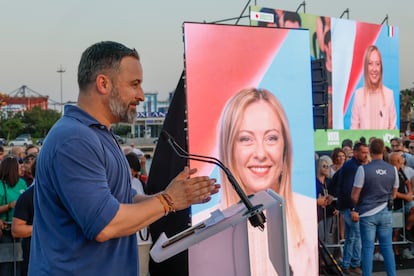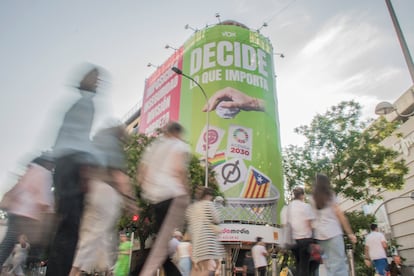Spanish election dents Meloni’s plan to spread far-right alliances in Europe
The Italian prime minister needed a resounding result from the right to expand her model to other countries and the European Parliament, but Vox lost 19 seats and the conservative Popular Party has fallen short of an absolute majority


“The time of the patriots in Europe has come.” That’s what Italian Prime Minister Giorgia Meloni told supporters of Spain’s far-right party Vox at a campaign rally on July 13 ahead of the Spanish election. Meloni, who is the leader of the Italian far-right party Brothers of Italy, was hoping Vox would make gains at the July 23 vote. But, the left resisted, with Vox losing 19 seats in Congress. And while some polls predicted that the conservative Popular Party (PP) would win an absolute majority, it fell far short of that mark. Even with the support of Vox, the PP does not have the 176 seats needed to form a government without additional backing. Whatever Meloni meant by “patriots,” it appears their time has yet to come.
The results of the Spanish election, which could see the coalition between the Socialist Party (PSOE) and the leftist alliance Sumar return to power, is a heavy blow for Meloni. Spain was meant to be the first stage in her plan for far-right parties to gain greater prominence in the European Parliament. This plan was drawn up months ago and was intended to take shape this September. Meloni — who is president of the European Conservatives and Reformists (ECR) group of the European Parliament — was hoping that a win for the right in Spain would allow her to build a new alliance in Brussels and extend her political project on a European level. In Italy, Meloni leads a coalition made up of Brothers of Italy, which is a member of the ECR, and Forza Italia, which is a member of the conservative European People’s Party (EPP): the far-right and the center-right working together. The plan was to promote this model across Europe, but the results of Sunday’s election in Spain are a major setback. The Meloni model, they believe in Rome, has run aground at the first stop on its European trip.

The Spanish elections had raised great expectations in Italy. In Spain’s Socialist prime minister, Pedro Sánchez, Italy saw the last bastion of resistance to the far-right wave that has been spreading across Europe. Elly Schlein, the secretary of Italy’s Democratic Party (PD), called him that same night of the elections to congratulate him on the results. For Meloni’s party, the Spanish election was a test of whether the shift to the far right would continue. A coalition between the PP and Vox would help normalize the parties that make up the ECR, and end the cordon sanitaire against far-right parties in Europe — a boundary that has already been broken in Italy. But the plan did not work. “The black wave has been stopped in Spain,” read the headline of the Turin newspaper La Stampa, referring to the color traditionally associated with fascism.
The Meloni model is also supported by Antonio Tajani, the coordinator of Forza Italia and vice president of the EPP, and Manfred Weber, the president of EPP. Indeed, ahead of the Italian election, Weber traveled to Rome to show his support for an alliance between Forza Italia (a member of the EPP) and Meloni’s Brothers of Italy. And he supported a similar alliance in Spain. Sunday’s election, however, has hampered his plan to spread this model.
Just days before the election, the leader of Spain’s mainstream conservative PP, Alberto Núñez Feijóo, said he was open to working with Meloni at the European level. In an interview with the Spanish newspaper El Mundo, Feijóo said Meloni’s party should be allowed to enter the EPP. “It will depend on the attitude of Ms. Meloni,” he said, then added that her ideas cause “much less” alarm now than when she took office in October 2022.
European elections will be held in June 2024, and there is a lot of anticipation about whether the far right and right will be able to dislodge the Socialist majority. The parties that make up the EPP do not govern in any of the six countries with the greatest weight: Germany, France, Italy, Spain, Poland and the Netherlands. In Finland, however, the moderate right negotiated with the hard right of the Finns Party, which now play a fundamental role in the Finnish government.
Meloni has not made any public statement regarding the Spanish elections. But her party has conceded that the result is a major setback. Regardless of whether she achieves her goal, the results of Sunday’s election have slowed down her plan, and means she could lose her main ally. Among the right in Italy, the only person pleased by the outcome is Matteo Salvini, the leader of Italy’s far-right Lega party, which is also part of Meloni’s governing coalition. In the European Parliament, Lega is part of the Identity and Democracy group, which also includes Germany’s far-right group Alternative for Germany (AfD) and France’s National Front, which is led by Marine Le Pen. This group has been marginalized by both the EPP and the ECR, which consider them too far-right. “In Europe, we can only win together,” said sources from Liga said on Tuesday.
Sign up for our weekly newsletter to get more English-language news coverage from EL PAÍS USA Edition
Tu suscripción se está usando en otro dispositivo
¿Quieres añadir otro usuario a tu suscripción?
Si continúas leyendo en este dispositivo, no se podrá leer en el otro.
FlechaTu suscripción se está usando en otro dispositivo y solo puedes acceder a EL PAÍS desde un dispositivo a la vez.
Si quieres compartir tu cuenta, cambia tu suscripción a la modalidad Premium, así podrás añadir otro usuario. Cada uno accederá con su propia cuenta de email, lo que os permitirá personalizar vuestra experiencia en EL PAÍS.
¿Tienes una suscripción de empresa? Accede aquí para contratar más cuentas.
En el caso de no saber quién está usando tu cuenta, te recomendamos cambiar tu contraseña aquí.
Si decides continuar compartiendo tu cuenta, este mensaje se mostrará en tu dispositivo y en el de la otra persona que está usando tu cuenta de forma indefinida, afectando a tu experiencia de lectura. Puedes consultar aquí los términos y condiciones de la suscripción digital.








































